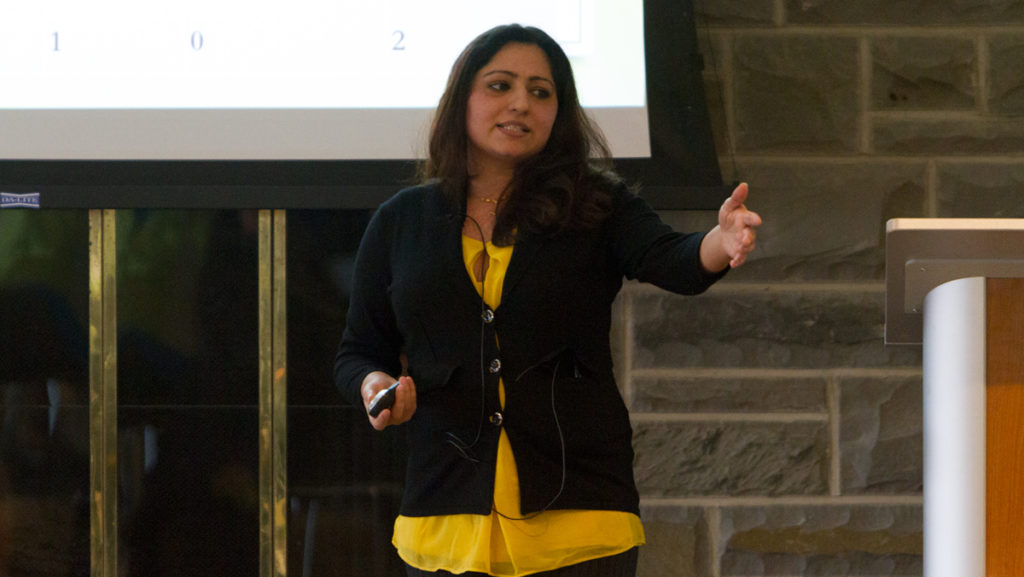Three diversity scholar fellows from the School of Humanities and Sciences and the Roy H. Park School of Communications shared their works on minority groups during the Diversity Scholar Research Showcase on March 29.
Raul Palma, diversity scholar fellow in the Department of Writing, began the showcase with a discussion and reading of his creative dissertation and novel. Shehnaz Haqqani, diversity scholar fellow in the Women’s and Gender Studies program, followed by a discussion of her research on how gender patterns influence Islamic views on gender. Lastly, Nate Rodriguez, diversity scholar fellow in the Department of Strategic Communications and assistant professor of digital media at San Diego State University, discussed his research on gay refugees and asylees and the role media has on their identification. Approximately 40 people attended.
Palma’s novel, “Manteca,” follows Richie, a 15-year-old Cuban–American boy living in Miami in the 1980s. The story follows Richie as he falls in love with his sister and his family is forced to move so a highway can be built where they live.
“I depict Miami as a form of technology designed to produce exceptional narratives,” Palma said of his dissertation.
Palma said he was inspired by “The Coming Community” by Giorgio Agamben, which discusses philosophy as well as ethics between groups of people.
Haqqani said her research was inspired by a Muslim woman, Amina Wadud, who in 2005 led a mixed-gender prayer. She said she was also inspired by Muslim backlash to ISIS’ attempt to revive slavery in 2012.
Haqqani showed a picture of a sign that a man held in protest of Wadud’s prayer, which read, “Mixed-gender prayer today, hellfire tomorrow.”
In Islam, women are not allowed to lead mixed-gender prayers, and they inherit half the amount of money that their brothers do. Women are also not allowed to marry outside of their religion, whereas men can marry Muslim, Christian or Jewish women, Haqqani said.
Haqqani’s research looked into how 40 married and single Sunni American Muslim men and women in Austin, Texas, viewed women leading mixed-gender prayers, women marrying outside of their religion, child marriage and sexual slavery.
Haqqani said that overall, both men and women felt that the Islamic belief in child marriage and sexual slavery was nonbinding, but she said that more women than men felt that women should be allowed to lead mixed-gendered prayers and marry outside of their religion, despite the traditional Islamic belief.
“Female-led prayer and women’s interfaith marriage were just constantly represented as irrelevant,” Haqqani said. “So many participants even got angry with me for talking about this — ‘Why can’t we talk about something more relevant? This is so irrelevant. This is so unnecessary.’”
Rodriguez discussed the dangers of being a member of the LGBTQ community by showing a map of the consequences in certain countries that included fines, lashings, imprisonment and the death penalty.
Rodriguez’s research included interviewing gay refugees and asylees on their lives and what role media played in finding their identities. However, not many refugees were willing to talk because they were afraid it could negatively impact their acceptance into the nongovernmental organization asylums for LGBTQ refugees.
Rodriguez said that after being accepted into an asylum, most refugees stopped looking toward social media for ways define themselves. He also said that there were some who wanted to use their success to help other refugees, while there were some who did not want to be known as refugees.
“‘Refugee’ was a term that some of them embraced, it said, ‘This is who I am. I don’t want to forget who I am because I need to help other people,’” Rodriguez said. “A lot of them also wanted to reject it. They said, ‘It has such a negative term. People categorize me negative ways. That’s a part of my life I want to leave behind me. I don’t want to be known as a refugee.’”
Sophomore Thomas Conti said he attended the event after hearing about it through two of his professors. Conti said he was surprised at how much he learned.
“I was kind of shocked and surprised that I didn’t know a lot about what was said, and it made me reflect that I should do more research and be more aware of other issues going on in the world around me,” Conti said.
Freshman Erin Clarke said she found the showcase interesting and found that it addressed a lot of important topics.
“All of their dissertations cover very interesting topics that are very important in today’s society,” Clarke said. “They’re very big topics that definitely need to be addressed and that I don’t think a lot of people know about either.”








